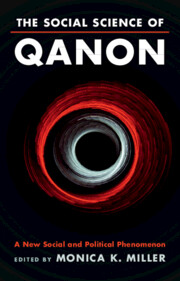Book contents
- The Social Science of QAnon
- The Social Science of QAnon
- Copyright page
- Dedication
- Contents
- Contributors
- Preface
- Part I Introduction to QAnon
- Part II Recruiting and Maintaining Followers
- Part III QAnon and Society
- Chapter 8 QAnon in the Year 2020
- Chapter 9 QAnon and the Politics of 2020
- Chapter 10 The QAnon Conspiracy Narrative
- Chapter 11 The Need to Belong
- Part IV The Role of Communication in Promoting and Limiting QAnon Support
- Part V The Future of QAnon
- Index
- References
Chapter 9 - QAnon and the Politics of 2020
from Part III - QAnon and Society
Published online by Cambridge University Press: 14 September 2023
- The Social Science of QAnon
- The Social Science of QAnon
- Copyright page
- Dedication
- Contents
- Contributors
- Preface
- Part I Introduction to QAnon
- Part II Recruiting and Maintaining Followers
- Part III QAnon and Society
- Chapter 8 QAnon in the Year 2020
- Chapter 9 QAnon and the Politics of 2020
- Chapter 10 The QAnon Conspiracy Narrative
- Chapter 11 The Need to Belong
- Part IV The Role of Communication in Promoting and Limiting QAnon Support
- Part V The Future of QAnon
- Index
- References
Summary
QAnon attracted considerable attention from politicians and the press during 2020. Headlines claimed that the group had exploded across social media platforms and was becoming mainstream; these claims were supported by instances of violence and studies of online activity. However, public opinion polls tell a different story. We examine polling data from 2018–2021 to understand the size and scope of QAnon support. Only 5–8 percent of the American public supports QAnon, making it one of the least supported conspiracy theories typically polled on. Moreover, support for the QAnon movement has remained stable over time, with no indication of becoming “mainstream.” We also find that QAnon support is less the product of left-right orientations, as often argued, than anti-establishment sentiments and anti-social personality traits. We argue that politicians strategically trafficked in QAnon rhetoric to expand their support, simultaneously activating a once irrelevant dimension of public opinion.
- Type
- Chapter
- Information
- The Social Science of QAnonA New Social and Political Phenomenon, pp. 140 - 158Publisher: Cambridge University PressPrint publication year: 2023

